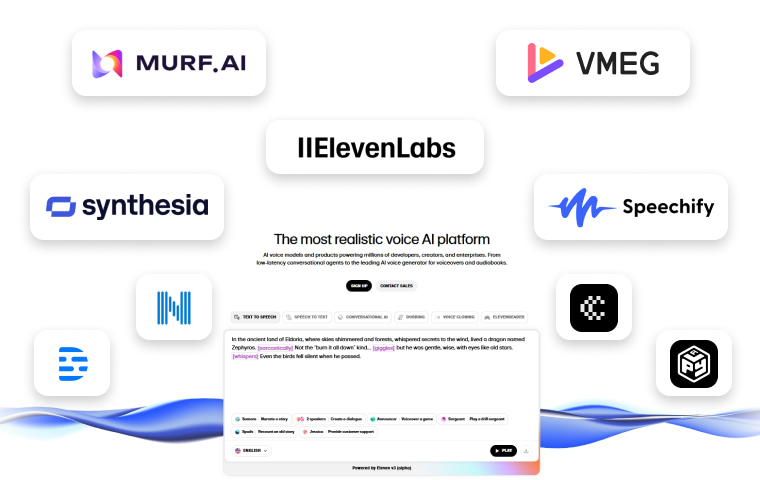
As demand for multilingual content continues to rise, the market for text-to-speech and AI-powered video translation is expanding rapidly.
The global market for Text-to-Speech was estimated at US$3.8 Billion in 2023 and is projected to reach US$9.3 Billion by 2030, growing at a CAGR of 13.4% from 2023 to 2030.
While ElevenLabs has gained attention for its ultra-realistic voice synthesis and cloning capabilities, it’s not the only option on the market.
Depending on your needs—whether you're focused on video dubbing, language translation, or content localization. There are other platforms that may be a better fit for your workflow.
This article introduces eight alternatives to ElevenLabs, offering unique combinations of TTS, translation, and localization tools. We’ll explore each platform’s key strengths and limitations to help you choose the right solution.
ElevenLabs VS Alternatives
| Tool | TTS | Languages Supported | Video Translation | Best For |
| ElevenLabs | ✅ | 70+ | ✅ | Developers, Voice Projects |
| VMEG AI | ✅ | 170+ | ✅ | Content Creators & Training |
| PlayAI | ✅ | 80+ | ❌ | Developers & App Integrations |
| Cartesia | ✅ | 100+ | ⚠️(Basic) | Global Business & Localization teams |
| Murf AI | ✅ | 120+ | ⚠️(Partial) | E-learning & Marketing |
| Speechify | ✅ | 30+ | ❌ | Students & Accessibility Users |
| Descript | ✅ | 20 | ⚠️(Limited) | Podcast & Video Creators |
| Synthesia | ✅ | 120+ | ✅ | Corporate & Marketing |
| NaturalReader | ✅ | 20+ | ❌ | Students & Educators |
What Is ElevenLabs?
ElevenLabs is a leading AI voice platform known for its advanced voice cloning, natural-sounding speech, and support for multiple languages.
It has been adopted by content creators, audiobook publishers, and developers looking for scalable voice generation.
However, some users may seek alternative platforms that offer more flexible pricing, better video translation capabilities, or simpler interfaces.
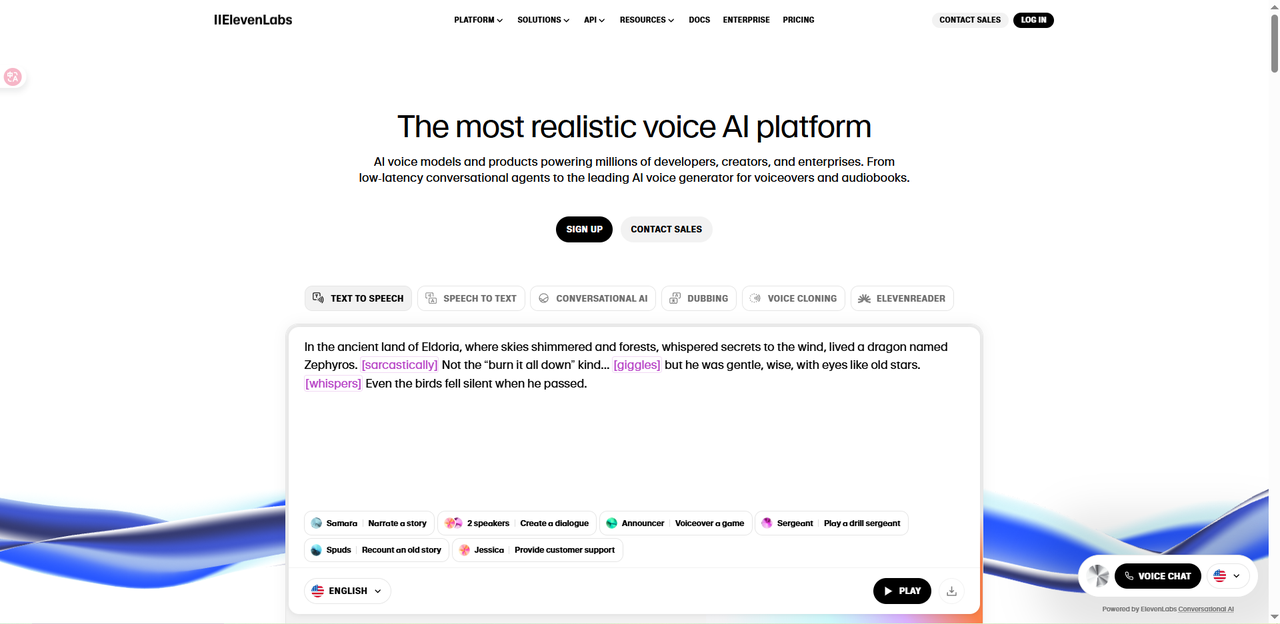
Why Consider ElevenLabs Alternatives?
ElevenLabs is powerful but may not meet every requirement. Some users may find its translation options limited, its pricing high for scale, or its interface more suited for developers than general users.
Alternatives may offer:
- Integrated video dubbing tools
- Simpler workflows for non-technical users
- Competitive pricing for startups or educators
- Stronger support for global languages and accents
VMEG AI
Lightweight Localization Platform for Video Translation and TTS
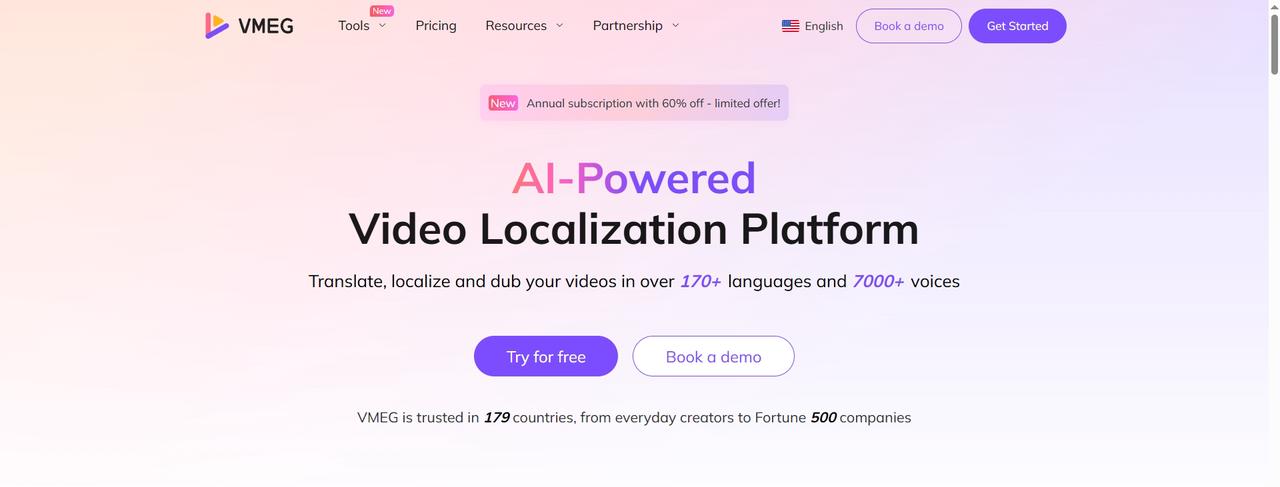
Pros
- Designed specifically for content creators seeking efficient video translation, voiceover generation, and subtitle localization
- Offers multilingual text-to-speech with natural-sounding voice inflections across a wide range of tones
- Lightweight localization platform optimized for global use, supporting more than 170 languages
- Delivers high value for cost, featuring access to a diverse library of over 7,000 AI-generated voices
Cons
- Still growing its voice library and advanced features
VMEG
Your AI-powered video and audio localization platform online
PlayAI
High-Quality TTS with Voice Cloning and API Access
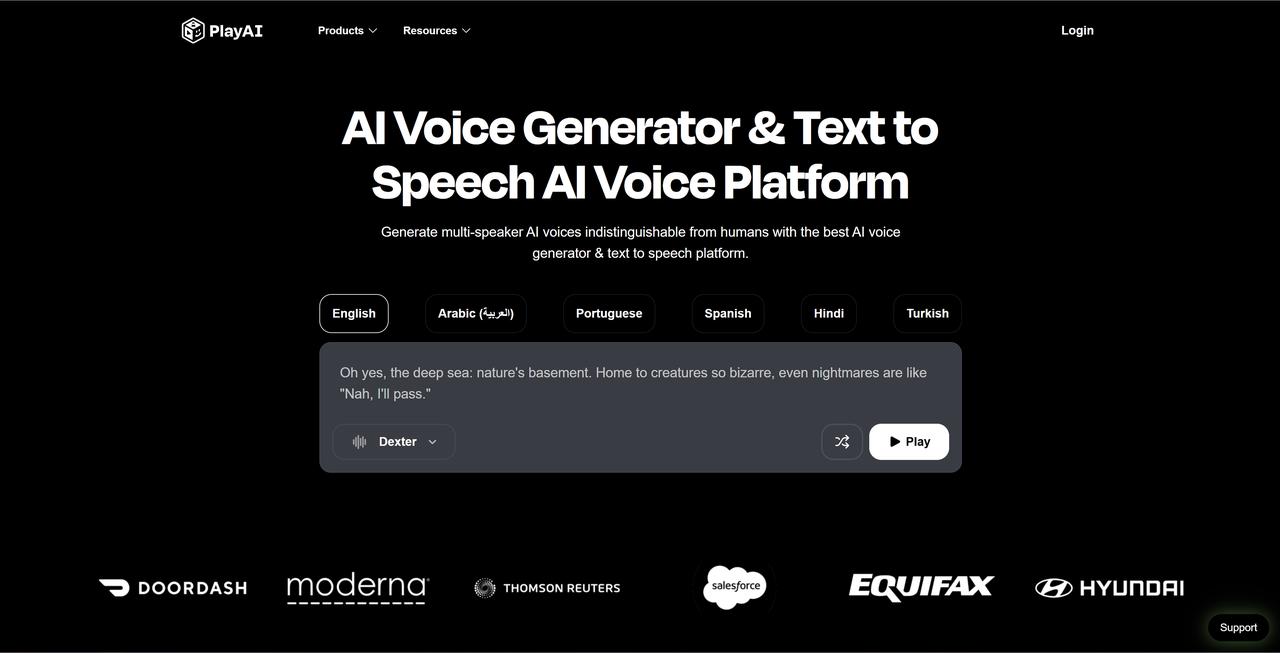
Pros
- Offers ultra-realistic voice cloning similar to ElevenLabs
- Developer-friendly API for scaling voice features into apps
- Wide voice and language support
Cons
- No built-in video translation or dubbing
- Limited editing features compared to some creative platforms
Cartesia
Multilingual TTS and AI Voiceovers with Translation Capabilities

Pros
- Built-in translation and multilingual voice synthesis
- Focuses on voice quality and clarity for global content
- Supports localization use cases across industries
Cons
- UI and workflow may be more suited to enterprise users
- Not ideal for small content creators needing video tools
Murf AI
Quality Voiceovers and Localization Features
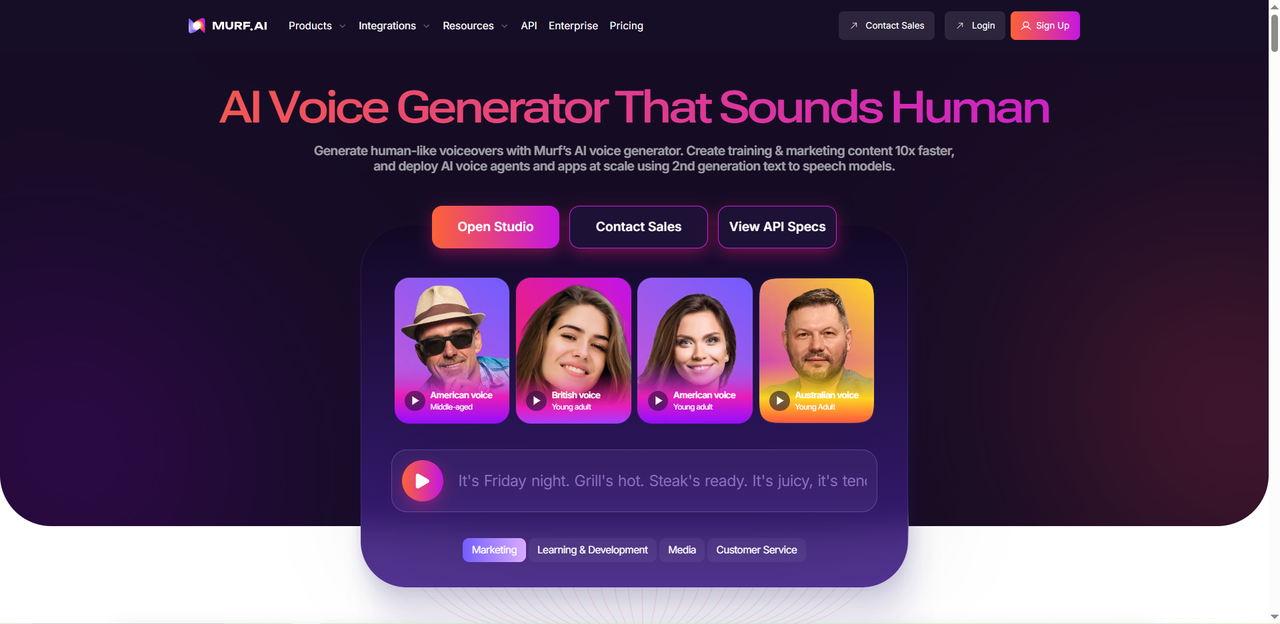
Pros
- Clean interface with timeline editing for voiceovers
- Offers voice generation in multiple accents and languages
- Popular with eLearning, marketing, and training teams
Cons
- Limited real-time translation tools
- Doesn’t support lip-sync or avatar-based video generation
Speechify
Fast, Accessible TTS Across Multiple Platforms

Pros
- Available as browser extension, mobile app, and desktop tool
- Easy to use for reading PDFs, webpages, and documents aloud
- Supports multiple languages and playback speeds
Cons
- Focused on accessibility and reading, not video translation
- Fewer customization options for voice generation
Descript
Audio & Video Editing with Overdub and Multilingual Tools

Pros
- Integrated video and audio editor with AI voice dubbing
- Overdub feature allows voice cloning and correction
- Suitable for podcast and video creators
Cons
- Overdub voice requires user training and voice consent
- Limited to certain languages for TTS and translation
Synthesia
AI Avatar Videos with Native-Language Voiceovers
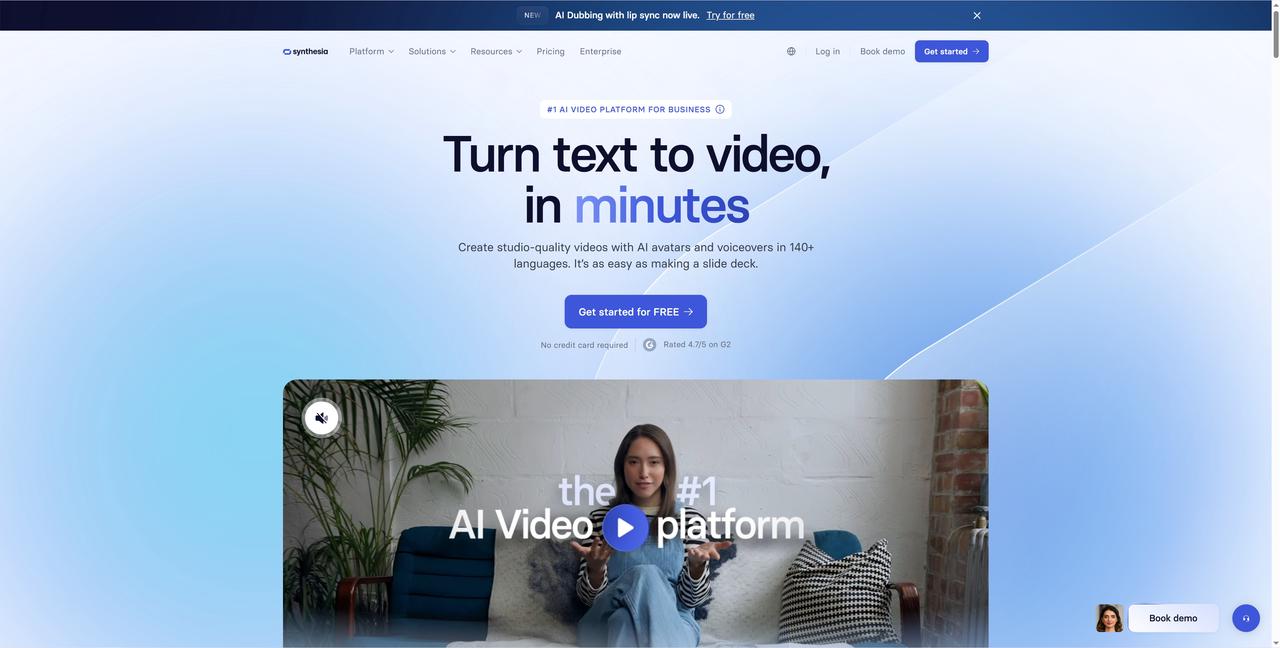
Pros
- AI avatars deliver video content in over 120 languages
- Natural voice styles suited for corporate training and marketing
- Streamlined video creation workflow
Cons
- Less flexibility for raw voice file downloads
- Voice customization is more limited
NaturalReader
Simple Yet Effective TTS for Learning & Business

Pros
- Well-suited for students, educators, and office use
- Offers web-based and desktop versions
- Natural-sounding voices with OCR support
Cons
- No translation or video dubbing features
- Primarily for reading and document narration
Which ElevenLabs Alternative Is Right for You?
Choosing the right ElevenLabs alternative depends on your specific needs. If video translation is your priority, VMEG AI and Synthesia offer strong integrated workflows.
For those focused on audio voiceovers with developer tools, PlayHT and Murf AI stand out. And if you’re looking for basic reading assistance or document narration, Speechify and NaturalReader may be more appropriate.
Each tool comes with its own strengths and trade-offs. We recommend testing free versions where available to see which platform aligns best with your content goals and budget.
Each tool comes with its own strengths and trade-offs. We recommend testing free versions where available to see which platform aligns best with your content goals and budget.
FAQs
Q1. What is VMEG and how does it compare to ElevenLabs?
A1: VMEG is a lightweight AI localization platform designed for content creators who need video translation, TTS, subtitle generation, and dubbing. While ElevenLabs focuses on ultra-realistic voice synthesis, VMEG offers a more integrated workflow for creators needing both voice and video localization across 170+ languages.
Q2. Can I use VMEG for both audio and video translation?
A2: Yes. VMEG supports video-to-video translation with voiceover, TTS in multiple languages, subtitle generation, and subtitle translation — all in one streamlined platform.
Q3. What audio and video formats does VMEG support for download?
A3: VMEG allows users to download their content in popular formats such as MP3, WAV, MP4, and SRT. This makes it compatible with most editing software and social platforms.
Q4. Does VMEG offer voice cloning or AI voice customization like ElevenLabs?
A4: Yes. VMEG provides access to over 7,000 AI voices, and supports advanced voice customization including gender, accent, style, and speed. Voice cloning is in development and will be launched in future updates.
Q5. What languages does VMEG support for TTS and translation?
A5: VMEG supports 170+ languages, including English, Spanish, French, Arabic, Hindi, Japanese, Korean, Portuguese, and more — ideal for global content localization.